Table of Contents
henry ford, the founder of the Ford Motor Company, revolutionized the automotive industry with his innovative ideas and mass production techniques. His vision and determination transformed the way people traveled and shaped the modern world. At Westernfordhcm, we delve into the life and legacy of Henry Ford, exploring his contributions to the automotive industry, his impact on society, and the enduring principles that continue to inspire entrepreneurs and innovators today.
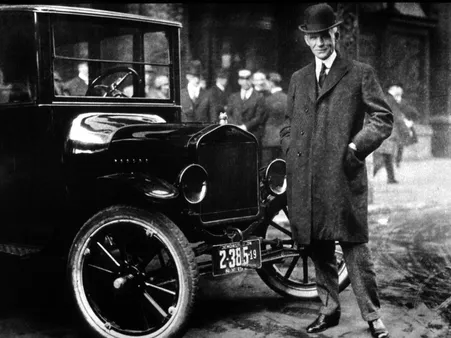
Henry Ford: The Automotive Pioneer Who Revolutionized Transportation
I. Henry Ford: The Automobile Pioneer
Henry Ford was an American industrialist, the founder of the Ford Motor Company, and sponsor of the development of the assembly line technique of mass production. Although Ford did not invent the automobile, he developed and manufactured the first automobile that was affordable for the middle class American. Ford had a global vision, with consumer demand for automobiles rising in Europe in the late 1900s. He established his first overseas operation in 1911 in Manchester, England, and went on to open plants in other countries, including Canada, France, Germany, and Spain. By the 1920s, Ford had factories on six continents. Read more about Ford Model T
Ford was born on a farm in Greenfield Township, Michigan, on July 30, 1863. He showed an early interest in mechanics and left the farm at the age of 16 to work as an apprentice machinist in Detroit. In 1891, he married Clara Jane Bryant, and the couple had one child, Edsel Bryant Ford. Ford's first automobile, the Quadricycle, was completed in 1896. He founded the Ford Motor Company in 1903, and the company's first car, the Model A, was introduced in 1903. Read more about Ford Model A
Year | Model | Production |
|---|---|---|
1903 | Model A | 1,708 |
1906 | Model N | 6,395 |
1908 | Model T | 15,000,000 |
The Model T was an instant success, and Ford soon became one of the richest men in the world. He used his wealth to improve the lives of his workers and to promote peace and understanding around the world. Ford was a controversial figure, and his views on labor relations and social issues were often unpopular. However, there is no doubt that he was one of the most influential figures in American history. Read more about Ford Mustang
Ford died on April 7, 1947, at the age of 83. He was survived by his wife, Clara, and his son, Edsel. Ford's legacy lives on through the Ford Motor Company, which is still one of the largest and most successful companies in the world. Read more about Ford F-150
- Ford was a pioneer in the development of the automobile.
- He founded the Ford Motor Company in 1903.
- The Model T was an instant success and made Ford one of the richest men in the world.
- Ford was a controversial figure, but there is no doubt that he was one of the most influential figures in American history.
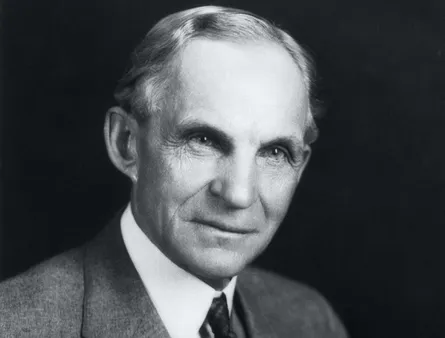
Henry Ford: The Automobile Pioneer
II. Ford's Early Life and Career
Early Life
Henry Ford was born on July 30, 1863, on a farm in Greenfield Township, Michigan. He was the eldest of six children born to William and Mary Ford. His father was a farmer and his mother was a homemaker. Ford had little formal education, attending school only until the age of 15. He then left home to work as an apprentice machinist in Detroit.
In 1888, Ford married Clara Jane Bryant. The couple had one child, Edsel Ford, who was born in 1893. Ford continued to work as a machinist until 1899, when he quit his job to start his own company, the Ford Motor Company.
Ford Motor Company
The Ford Motor Company was founded on June 16, 1903, with an initial investment of $28,000. The company's first car, the Model A, was released in 1903. The Model A was a success, and Ford soon began to expand his company. In 1908, he introduced the Model T, which became one of the most popular cars in history.
Ford's success was due in part to his innovative use of the assembly line. The assembly line allowed Ford to mass-produce cars, which made them more affordable for the average consumer. Ford also paid his workers well, which helped to create a loyal workforce.
Later Life
Ford continued to lead the Ford Motor Company until 1945, when he retired. He died on April 7, 1947, at the age of 83. Ford is considered one of the most important figures in American history. He revolutionized the automobile industry and helped to create the modern world.
Year | Event |
|---|---|
1863 | Henry Ford is born. |
1888 | Ford marries Clara Jane Bryant. |
1899 | Ford quits his job to start his own company, the Ford Motor Company. |
1903 | The Ford Motor Company is founded. |
1908 | Ford introduces the Model T. |
1945 | Ford retires from the Ford Motor Company. |
1947 | Ford dies. |
- Ford was a self-taught engineer.
- Ford was a pioneer in the use of the assembly line.
- Ford was a generous philanthropist.
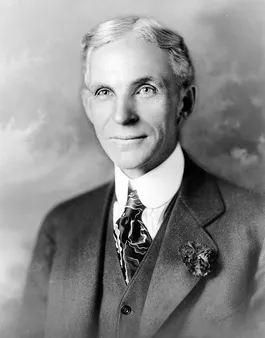
Ford's Early Life and Career
III. The Ford Motor Company
The Ford Motor Company, commonly known as Ford, is an American multinational automaker headquartered in Dearborn, Michigan, United States. It was founded by Henry Ford and incorporated on June 16, 1903. The company sells automobiles and commercial vehicles under the Ford brand, and luxury vehicles under the Lincoln brand. Ford is the second-largest automaker in the United States and the fifth-largest in the world based on 2021 production. The Ford Bronco is a popular SUV produced by Ford.
Ford's history can be traced back to the late 1890s, when Henry Ford began experimenting with gasoline-powered engines. In 1896, he built his first automobile, the Quadricycle. In 1903, he founded the Ford Motor Company with the financial backing of several investors. The company's first mass-produced car, the Model T, was introduced in 1908 and quickly became a bestseller. The Ford Motor Company has a long and storied history.
Year | Model | Sales |
|---|---|---|
1908 | Model T | 15,000,000 |
1913 | Model A | 4,000,000 |
1927 | Model B | 2,000,000 |
- Ford is the second-largest automaker in the United States.
- Ford is the fifth-largest automaker in the world.
- Ford sells automobiles and commercial vehicles under the Ford brand.
- Ford sells luxury vehicles under the Lincoln brand.
- Ford's history can be traced back to the late 1890s.
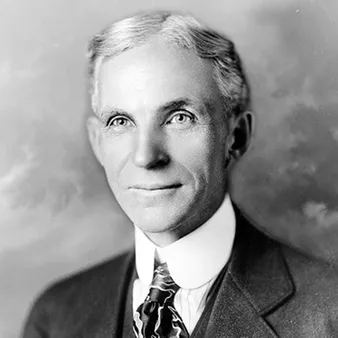
The Ford Motor Company
IV. Ford's Impact on the Automotive Industry
Henry Ford's assembly line revolutionized the automotive industry, making cars more affordable and accessible to the masses. Before Ford, cars were expensive, custom-made luxury items. Ford's Model T was the first mass-produced car, and it quickly became the best-selling car in the world. Ford's assembly line also made it possible to produce cars more quickly and efficiently, which further reduced costs.
In addition to his impact on the automotive industry, Ford was also a pioneer in the field of labor relations. He introduced the $5-a-day wage, which was double the going rate at the time. He also established an eight-hour workday and a five-day workweek. These policies helped to improve the lives of Ford's workers and set a new standard for the industry.
Year | Model | Sales |
|---|---|---|
1908 | Model T | 10,660 |
1913 | Model T | 185,665 |
1916 | Model T | 577,036 |
Ford's legacy is still felt today. The assembly line is still used in car factories around the world, and his labor policies have set a standard for the industry. Ford's Model T is still one of the most iconic cars in history, and it is still being produced today in limited numbers.
- Ford's assembly line revolutionized the automotive industry.
- Ford's Model T was the first mass-produced car.
- Ford's labor policies set a new standard for the industry.
- Ford's legacy is still felt today.
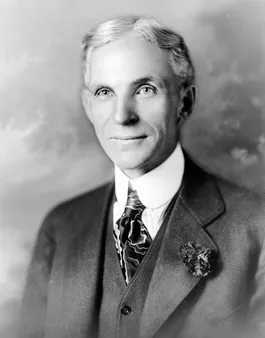
Ford's Impact on the Automotive Industry
V. Henry Ford's Legacy
Industrial Innovation
Henry Ford was a visionary industrialist who revolutionized the automobile industry with the introduction of the Model T. His innovative assembly line production process significantly reduced the cost of producing cars, making them accessible to the average American. Ford's relentless pursuit of efficiency and standardization also extended to other areas of his business, such as the establishment of vertically integrated supply chains.
Name | Tenure | Significant Achievements |
Henry Ford | 1903-1945 | Introduced the Model T, implemented the assembly line, revolutionized manufacturing processes, pioneered vertical integration |
Edsel Ford | 1919-1943 | Son of Henry Ford, played a key role in developing the Lincoln brand, oversaw the introduction of the V8 engine and other technological advancements |
Henry Ford II | 1945-1960, 1980-1982 | Grandson of Henry Ford, presided over the post-war expansion of the company, launched the Ford Mustang, faced numerous challenges and labor unrest |
Social and Economic Impact
Ford's innovations had a profound impact on American society. By making cars more affordable, he enabled ordinary people to experience greater mobility and freedom. Additionally, his introduction of the five-dollar workday and other progressive labor policies raised the standard of living for his workers. Ford's legacy as a business leader and philanthropist continues to shape modern industrial practices and social welfare initiatives.
Global Expansion
Under Henry Ford's leadership, the Ford Motor Company expanded its operations worldwide. By the early 20th century, Ford had established assembly plants in various countries across Europe, South America, and Asia. This global reach enabled Ford to capitalize on the growing demand for automobiles around the world and further solidified the company's status as an international industrial powerhouse.
Environmental Responsibility
Ford's impact on the environment has been a subject of debate. While his assembly line methods increased efficiency and reduced costs, they also generated significant pollution. However, Ford also made efforts to promote sustainability, including advocating for reforestation and supporting the use of alternative fuels.
- In his later years, Ford became an outspoken advocate for protecting the environment.
- He established the Ford Foundation, which has provided grants to organizations working on environmental issues.
- The Ford Motor Company has made commitments to reduce its carbon footprint and promote sustainability in its operations.
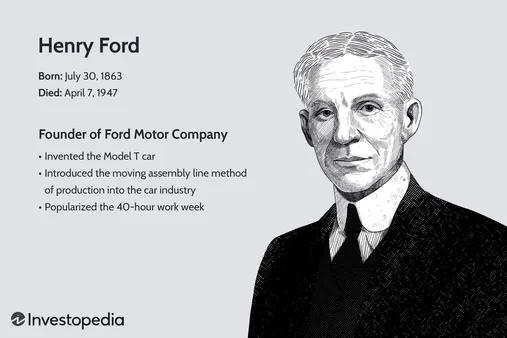
Henry Ford's Legacy
VI. Conclusion
Henry Ford was a visionary leader who revolutionized the automotive industry. His innovative ideas and business practices had a profound impact on the world, and his legacy continues to inspire entrepreneurs and business leaders today. Ford's commitment to innovation, efficiency, and affordability made the automobile accessible to the masses, and his assembly line production methods transformed manufacturing forever. He was a pioneer in the field of industrial relations, and his profit-sharing plan helped to improve the lives of his workers. Ford's impact on society was immense, and his contributions to the automotive industry and beyond will continue to be felt for generations to come.